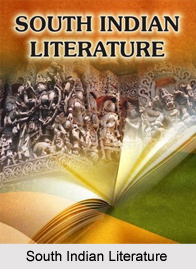 Vijayanagar rulers were patrons of learning. They encouraged and rewarded scholars and made no distinction on grounds of caste or creed. Be it a Jain writer or any other writer from other community, every scholar was rewarded.
Vijayanagar rulers were patrons of learning. They encouraged and rewarded scholars and made no distinction on grounds of caste or creed. Be it a Jain writer or any other writer from other community, every scholar was rewarded.
Sanskrit Literature
Sanskrit studies received a great impetus under the patronage of the Vijayanagar rulers. The great scholar Sayanacharya during the 14th century wrote bhasyas (commentaries) on Rig Veda Samhita, Kanva Samhita, Taittiriya Brahmana, Satapatha Brahmana, and Aitareya-ranyaka. Sayana will be remembered by posterity for his interpretation of the Vedic texts. Vyasaraya (1478-1539 A.D.) was another great Sanskrit scholar who flourished under the patronage of Krishnadeva Raya. Most of his works were devoted to Dvaita philosophy Bhatta Akalankedva, a Jain pandit wrote a grammar of Kannada in Sanskrit along with a commentary. Vedanta Desika (1268-1369 A.D.), a versatile scholar, wrote a number of works in Sanskrit. Most important of them are Yadavabhyudayam, a long poem on the life of Lord Krishna, Hamsa Sandesa on the model of Kalidasa`s Meghaduta, Sankalpa Suryodaya and Subhasita Nivi.
Madhvacharya was a well-known Sanskrit scholar who was intimately connected with the Vijayanagar royal family He was also minister at the court of Bukka I. He was author of a large number of works including Parasarasmriti - Vyakhya, Jivan-muktiviveka (on Advaita Vedanta) and JaUniniyanya Tamalavistara. Harihara IPs minister, Irugappa Dandanatha, was a scholar of repute. His lexicon Nanaratharatnamala is well known. Gangadevi, wife of Kampana, son of Bukka, deserves a pre-eminent place among the writers of the age. In her famous work Maduravijayam, she describes in mahakavya style the conquest of Madura by her husband. Deva Raya II is credited with the writing of Ratiratnadipika and Brahmasutravritti. Saluva Narasimha was the author of Ramabhyudayam. Krishnadeva Raya`s Sanskrit works include Madalasacharitra, Satyavaduprenanam, Sakalakanthasara Sangraharn, and Rasmanjari. The Prime Minister Saluva Timma, was the author of Bala Bharata Vyakhya. Lolla Lakshmidhara was the author of several works including an encyclopedia Divajnavilasa.
Rajanatha Dindima was the court poet during the reign of Achyutaraya. Mohanangi also identified with the wife of Rama Raja composed the love poem Marchhiparinayam. The most important scholar at the court of Venkata I, the later Vijayanagara ruler was Tatacharya. His famous works were Pandurangamahatmya and Satvika Brahma Vidya Vilasa. Appayya Dikshita wTote 101 works. His celebrated work Sivarkamanidipika shows his mastery over whole of Sanskrit literature. Vadiraja who flourished during 16th century is credited with 20 works including Vivarnavranam and Pasandakhandanam. Raghunatha Nayaka wrote Parijatapaharanam, which deals with the life of Lord Krishna. Religious literature also flowed from the monasteries of Sringeri, Melkote and Udipi.
A rare work on polity Akasabhairavakalpa, probably written by some politician or a minister of Vijayanagar, throwing light on the daily life of the rulers of Vijayanagar, the ministers as well as the life in the capital has survived vicissitudes of times. It is an anonymous work. Lakshmidhara`s Bharatasastrasangraha and Lakshminarayana`s Sangita Suryodaya are works on music produced during 16th century. Rajanatha II composed a historical poem in praise of Saluva Narasimha. Rajanatha III wrote another historical poem Achyutarayabhyuda-yam. Krishnadeva Raya wrote a drama called Ushaparinaya.
Telugu Literature
Nachana Somanatha composed Harivamsamu on Lord Krishna. Pillamawi Pina Virabhadra Kavi a great poet produced Telugu version of Kalidasa`s Sakuntala. The devotional music of Tallapaka Annamacharya occupies a unique place. Srinatha translated Naisadhiya Charita of Sri Harsha and wrote Kasikkandam and Vidhmatakam. Celebrated poets in the court of Devaraya include Jakkanna and Pinna Veerabhadra. Sarada a gifted poetess wrote 18 dramas. Krishnadeva Raya is famous for his Amuktamalyada the theme being marriage of Ranganatha and Goda Devi. Among his Ashta Diggajamulu or eight great poets Allasani Peddanna, Pingali Suranna and Tenali Rama-krishna were well known. Ramaraja Bhusana wrote Vasucharitramu and Harishchandra.
Kannada Literature
A large number of Kannada works were produced. Bhima Kavi translated Basava Purana into Kannada. Harihara II earned the title of promoter of Kannada learning. Mahalingadeva wrote Ekkottara Satsthala. Kumara Vyasa and Chamarasa wrote Bharata. The latter is also credited with the authorship of Prabhulingabilas. Bommarasa wrote Sundara Purana while Tontade Siddhesvara compiled Satsithalajna-masaramrta. Timmana Kavi wrote the closing chapters of Bharata. Kumara Valmiki composed Harishchandra (Kannada version) of Ramayana. Sridharadeva completed a work on medicine Vaidyamrita. Virupaksa Pandita wrote Channa Basava Purana. Bhattakalam Kedeva wrote a highly valuable work on grammar entitled Karnatakasabdanusasana.
Tamil Literature
There was comparative peace and prosperity in Tamil country after its conquest by Kampana. It led to the development of Tamil literature. Krishnadeva Raya patronized Tamil scholars. Tirumalainatha and his son Paranjotiyar were well-known scholars of the period. Sewaichch-buduvar translated Bhagavata Puranam into Tamil. Vadamalavi Annagalayyam was the author of Irusamaya Vilakkam a work on Vaisnavism. Jnanaprakasa Desikar was the author of two works Manjarippa and Kachchi Kalambakam. There were other poets such as Virakavirasar, Vadamalayar and Perumal Kaviraya.
Maraijananasambanadar was a well-known Tamil scholar who wrote a number of works such as Patipasupasappanuval, Sankarapanira-karananiy Sakalajyamasaran, etc. Kamalani Jnanaprakasa Pandit and Gurujananasambandar were authors of large number of works.
Revanasiddhar who flourished at the close of the 16th century wrote a lexicon Akarathi Nikandu. The great Tamil poet Tayumanavar (died A.D. 1662) wrote a number of works.













